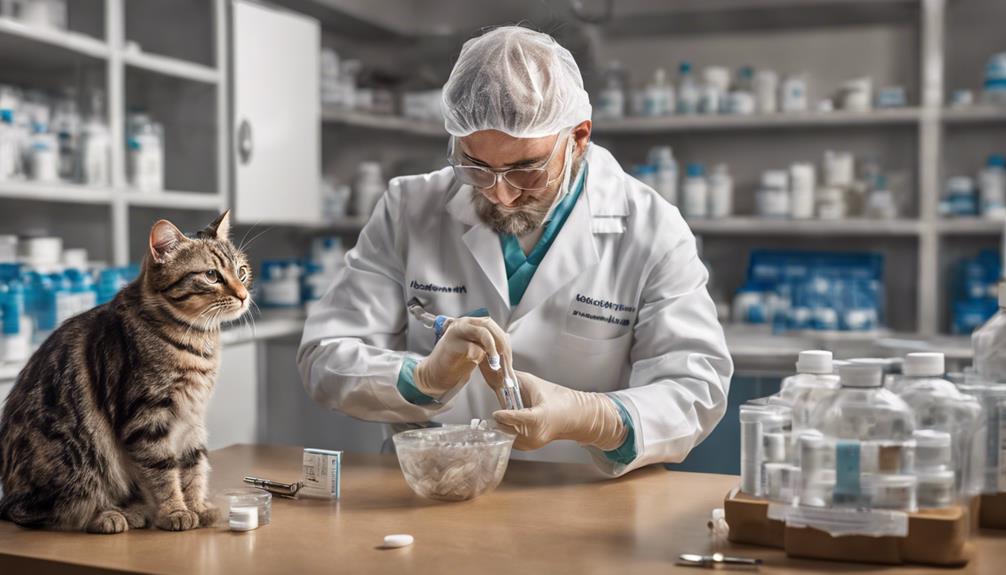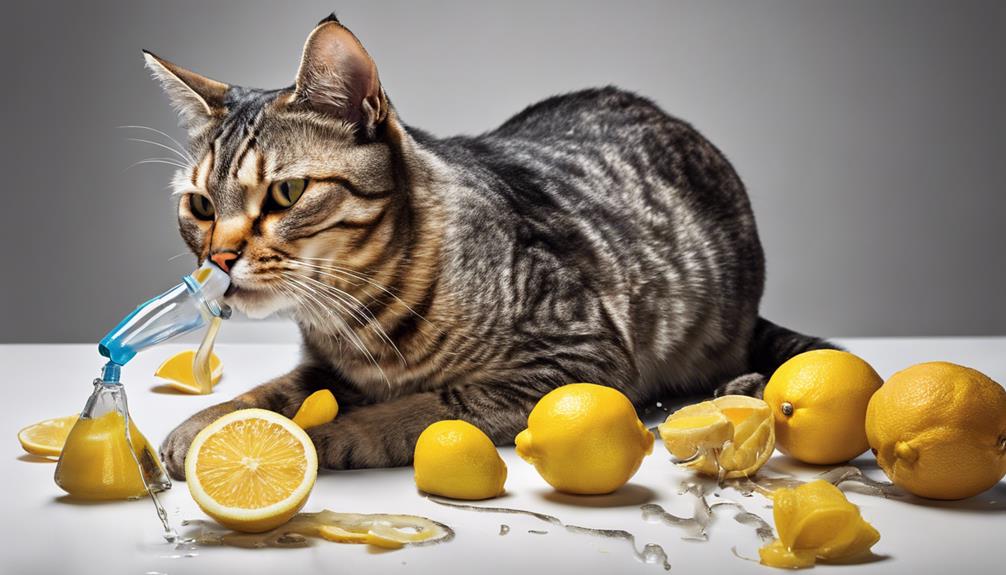When it comes to roundworm treatment for cats, a holistic approach is key. Regular deworming, personalized medications, and preventative steps are essential for managing these infections and ensuring our furry friends' well-being. Understanding symptoms, outdoor risks, and consulting with vets for tailored plans are important. Setting up a deworming schedule, using common treatments like Pyrantel Pamoate, and considering natural remedies can aid in combating roundworms. Don't forget to seek advice from professionals for personalized guidance. A complete strategy is necessary in fighting roundworms effectively and safeguarding your cat's health for the long haul.
Key Takeaways
- Consult a vet for accurate diagnosis and tailored treatment plans.
- Follow a deworming schedule for kittens and adult cats.
- Use Pyrantel Pamoate or Panacur/Fenbendazole for treatment.
- Monitor progress and maintain homecare during treatment.
- Consider natural remedies like pumpkin seeds under veterinary guidance.
Understanding Roundworms in Cats
Roundworms infest cats due to their exposure to common intestinal parasites Toxocara cati and Toxascara leonina, which can reach lengths of up to 4 inches and are typically white to light brown. These pesky parasites are a common threat to our feline friends, lurking in the environment and waiting to infect unsuspecting cats. It's essential to understand the risks associated with roundworms in cats to protect our beloved pets from potential harm.
These roundworms can easily find their way into our cats through various means, such as contact with infected animals, contaminated soil, or even through the milk of infected mothers. Once inside our cats, these parasites can wreak havoc on their delicate systems, causing symptoms like vomiting, diarrhea, weight loss, coughing, and respiratory issues. By knowing how roundworms operate and the ways they can enter our cats' bodies, we can take proactive steps to prevent and treat these infections effectively.
Let's dive deeper into the world of roundworms and equip ourselves with the knowledge needed to keep our feline companions healthy and happy.
Recognizing Symptoms of Roundworm Infection
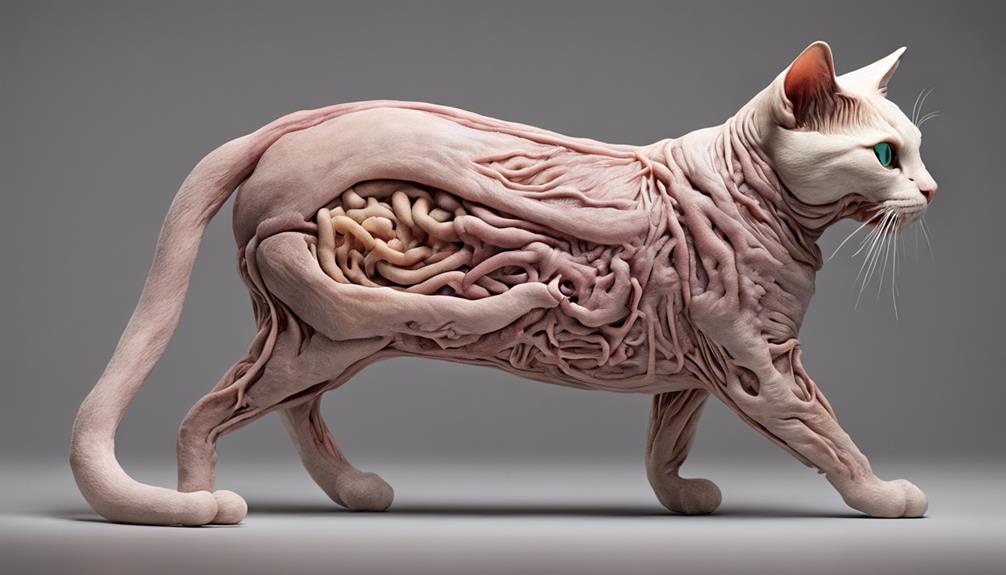
As responsible cat owners, we must be vigilant in recognizing the symptoms of roundworm infection in our feline companions. Common signs to watch out for include vomiting, diarrhea, weight loss, and coughing.
Kittens may also exhibit poor growth, a bloated abdomen, and increased vocalization, while adult cats might show dull coats, lethargy, and a decreased appetite.
Common Roundworm Symptoms
How can you easily identify the symptoms of roundworm infection in cats?
When it comes to roundworms, kittens often show signs like vomiting, diarrhea, weight loss, and a bloated belly. Keep an eye out for these indicators, especially in young cats.
In adult felines, symptoms may include diarrhea, weight loss, a lackluster coat, vomiting, and even coughing. Severe infections with a high number of roundworms could lead to intestinal blockages, posing a serious threat to your furry friend's health.
Behavioral Changes in Cats
When cats are infected with roundworms, their behavior may undergo noticeable changes, including increased appetite. Cats may exhibit signs like itching or scooting their bottom on the floor, indicating discomfort from the roundworm infection.
Additionally, weakness and lethargy could be observed in infected cats as a symptom of the condition. Vomiting and diarrhea are common behavioral symptoms that indicate a potential roundworm infection in cats.
Keep an eye out for kittens with roundworms, as they may display an enlarged abdomen, giving them a pot-bellied appearance.
Recognizing these behavioral changes is pivotal in identifying and treating roundworm infections promptly to safeguard the well-being of your feline companions.
Risks of Outdoor Activities for Cats

Engaging in outdoor activities exposes cats to various risks, including the potential ingestion of roundworm eggs from soil or infected prey. Here are three key risks to keep in mind:
- Contaminated Environments: Cats can easily pick up roundworms by encountering contaminated feces in outdoor areas. It's important to be vigilant and prevent cats from exploring areas where infected animals may have defecated.
- Hunting Behavior: Cats' natural instinct to hunt birds and rodents outdoors can lead to exposure to roundworms. These small prey animals can carry roundworms, increasing the risk of infection for outdoor cats.
- Interactions with Wildlife: Infected wildlife and stray cats can also contribute to the transmission of roundworms in outdoor environments. Cats that roam freely outdoors are more likely to come into contact with these sources of infection.
To safeguard your feline companions, regular deworming and preventive measures are vital for outdoor cats to minimize the risk of roundworm infections.
Importance of Veterinary Consultations

Exploring the risks associated with outdoor activities for cats underscores the important role of veterinary consultations in managing and preventing roundworm infections. Veterinary consultations are vital for accurate diagnosis and treatment plans tailored to your cat's specific needs. Vets offer expert advice on deworming schedules, medications, and preventive measures, ensuring your cat receives the best care possible.
Regular check-ups with a vet are essential for monitoring your cat's response to treatment and making any necessary adjustments. Veterinarians have the expertise to detect any underlying health issues or complications related to roundworm infections in cats, providing thorough care that goes beyond just treating the symptoms.
Trusting in veterinary consultations is key to ensuring the safe and effective use of deworming products for your beloved feline friend. By working closely with your vet, you can safeguard your cat's health and well-being against the dangers of roundworm infestations.
Establishing a Worming Prevention Schedule
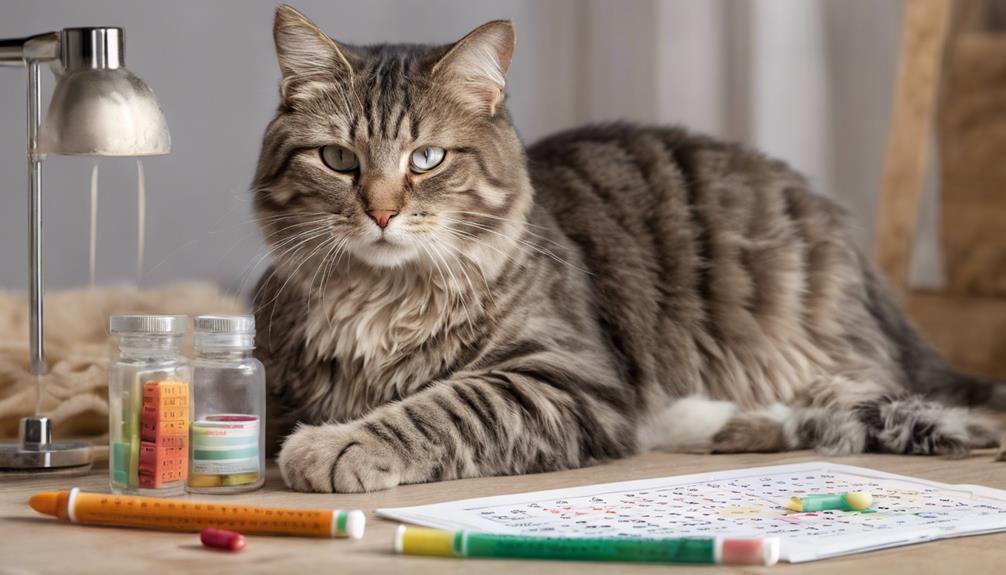
Developing a consistent worming schedule is vital for safeguarding your cat's health against roundworm infections. To make sure your feline friend stays protected, here are some key tips to establish a regular deworming routine:
- Kittens require more frequent deworming: Kittens should undergo deworming every 2 weeks until they reach 16 weeks of age. This frequent treatment helps prevent roundworm infections during their vulnerable early stages of life.
- Adult cats benefit from periodic deworming: Even after the kitten stage, regular deworming remains essential. Adult cats should be dewormed every few months to maintain a healthy worming prevention schedule and keep them protected from roundworms.
- Consult your vet for personalized guidance: Each cat is unique, and factors like age and lifestyle play a role in determining the ideal deworming schedule. Consulting with your vet ensures you receive tailored advice on the best approach to protect your cat from roundworm infection.
Signs of Roundworm Infestation in Cats

As cat owners, recognizing the signs of roundworm infestation in our feline companions is vital. Symptoms like vomiting, diarrhea, weight loss, and a pot-bellied appearance are common indicators of roundworms in cats.
Keep an eye out for these behavioral changes, as early detection can make a significant difference in your cat's health and well-being.
Common Symptoms in Cats
Symptoms of roundworm infestation in cats commonly include weight loss, increased appetite, itchy bottom, weakness, dull coat, vomiting, and an enlarged abdomen, particularly noticeable in kittens. When suspecting roundworms, keep an eye out for these signs:
- Weight Loss: Your feline friend may start shedding pounds unexpectedly.
- Increased Appetite: Despite eating more, your cat might seem to be losing weight.
- Itchy Bottom and Weakness: Watch for any signs of discomfort or lack of energy in your furry companion.
Keeping a close watch on these symptoms can help you identify a potential roundworm infestation in your beloved cat. If you notice any of these signs, consulting with your veterinarian for proper diagnosis and treatment is crucial.
Behavioral Changes Observed
Observing behavioral changes in your cat can provide valuable clues indicating a possible roundworm infestation. Cats with roundworms may show increased appetite despite weight loss, a sign that the worms are stealing essential nutrients.
If you notice your cat itching or scooting its bottom on the ground, it could be a behavioral sign of roundworms. Weakness and a dull, dry coat are common behavioral symptoms that may suggest a roundworm infestation.
Keep an eye out for vomiting and diarrhea, as these could be indicators of potential roundworm infestations in cats. For kittens, an enlarged abdomen compared to their body size could be a visible sign of roundworms.
If you suspect your cat has roundworms, consult your veterinarian for proper diagnosis and treatment.
Treating Roundworm Infections in Cats
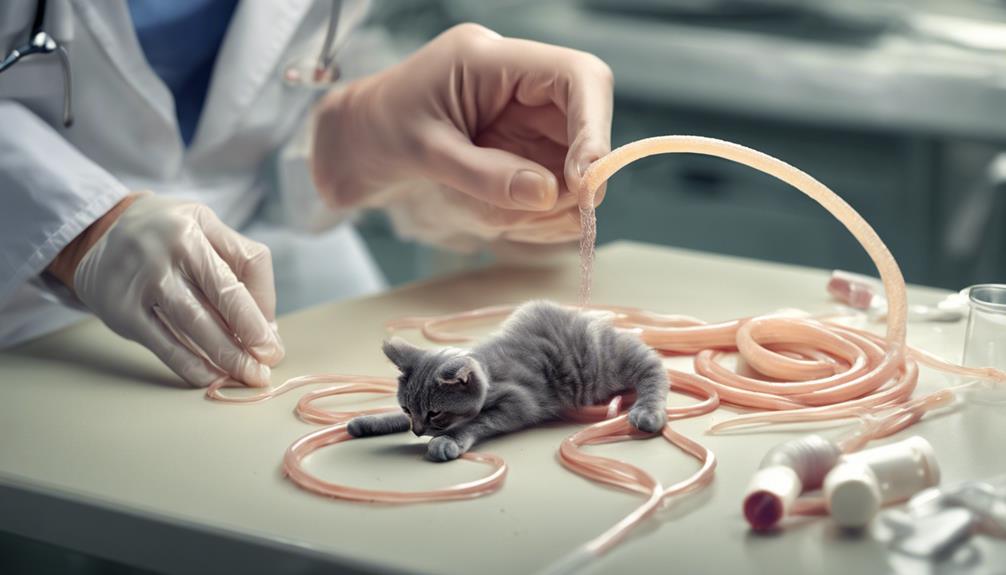
To effectively combat roundworm infections in cats, a combination of oral and topical medications is commonly prescribed. This treatment approach targets the intestinal parasites at various stages of their life cycle, ensuring a more thorough elimination process.
Here are three key points to contemplate when treating roundworm infections in cats:
- Follow the Treatment Schedule: Administering multiple doses of medication on a prescribed schedule is vital. This helps target all life stages of the roundworms, enhancing the effectiveness of the treatment.
- Monitor Progress: Keep a close eye on your cat's stool during and after treatment. Consecutive tests can help verify that the parasites are being eliminated successfully. Early detection of any issues allows for prompt adjustments to the treatment plan.
- Maintain Homecare: Implement proper homecare management during and post-treatment. Regularly clean the litter box to prevent re-infection and limit your cat's outdoor exposure to reduce the risk of contracting roundworms again. Consistent care is essential for your cat's overall health and well-being.
Special Considerations for Kittens
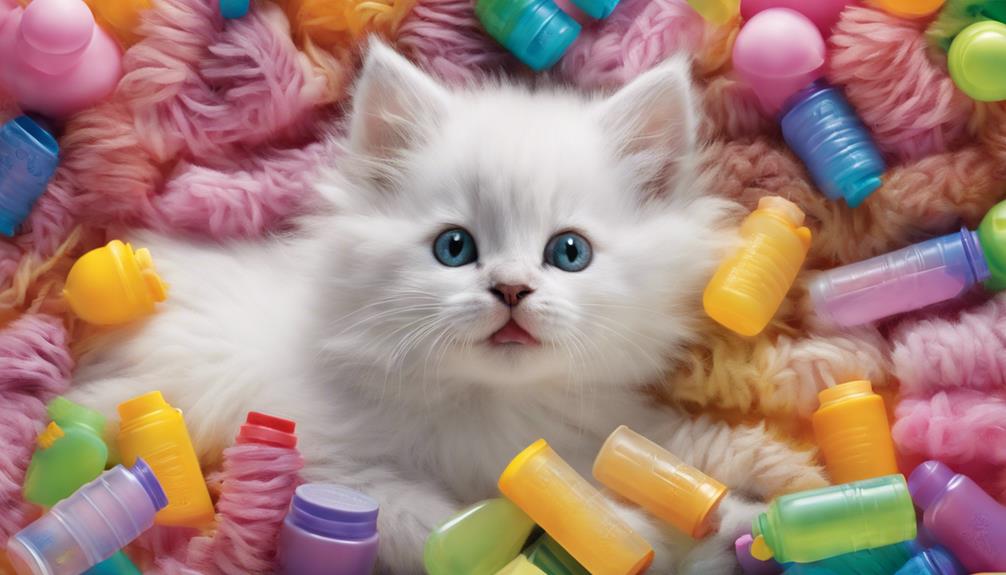
Kittens require special attention when it comes to roundworm treatment. Due to their vulnerable immune systems, they're more prone to infections.
Ensuring the accurate dosage based on their weight is essential for their health.
Kitten Weight Requirements
Starting at 4 weeks of age, young felines should be given deworming medication based on their body weight to guarantee proper care and development. Here are some essential points to take into account when deworming kittens:
- Weight-Based Dosage: The recommended dosage for kittens is 0.1 ml per pound of body weight. Ensuring the accurate dosage based on weight is critical for the effectiveness of the treatment.
- Frequency of Deworming: Deworming should be repeated every 2 weeks until kittens reach 16 weeks of age. This schedule helps address any potential reinfestation and ensures the kittens grow up healthy and strong.
- Preventative Measure: Regular deworming plays a crucial role in preventing the spread of roundworms in kittens, safeguarding their health and overall well-being.
Kitten Dosage Adjustments
Considering the unique needs of young felines, dosage adjustments for deworming treatments in kittens are essential for their well-being and safety. Kittens, due to their smaller size and developing immune systems, require special considerations when it comes to dosing dewormers.
The dosage is typically adjusted based on their weight to guarantee the treatment's effectiveness and safety. Following the recommended guidelines is important to prevent the risks of under or overdosing in kittens. These little ones may need more frequent deworming compared to adult cats, given their susceptibility to roundworms.
It's highly recommended to consult a veterinarian for proper dosing instructions and to schedule deworming treatments to keep your kittens healthy and free from parasites.
Prevention Methods for Roundworms

Regular deworming every few months is an essential preventive measure for ensuring cats remain free from roundworm infections. Here are three practical ways to help prevent roundworms in your feline friends:
- Maintain a Regular Deworming Schedule: Consistency is key when it comes to keeping roundworms at bay. By following a routine deworming schedule recommended by your veterinarian, you can help protect your cat from these pesky parasites.
- Keep Your Cat's Living Environment Clean: Regularly cleaning your cat's litter box and living area can help reduce the risk of roundworm transmission. Roundworm eggs can survive in the environment for extended periods, so maintaining cleanliness is vital.
- Prevent Hunting and Roaming: If your cat has outdoor access, try to limit their hunting activities to prevent them from ingesting prey that may be infected with roundworms. Keeping your cat indoors or supervising outdoor adventures can help lower the risk of exposure to these parasites.
Benefits of Consulting a Veterinarian
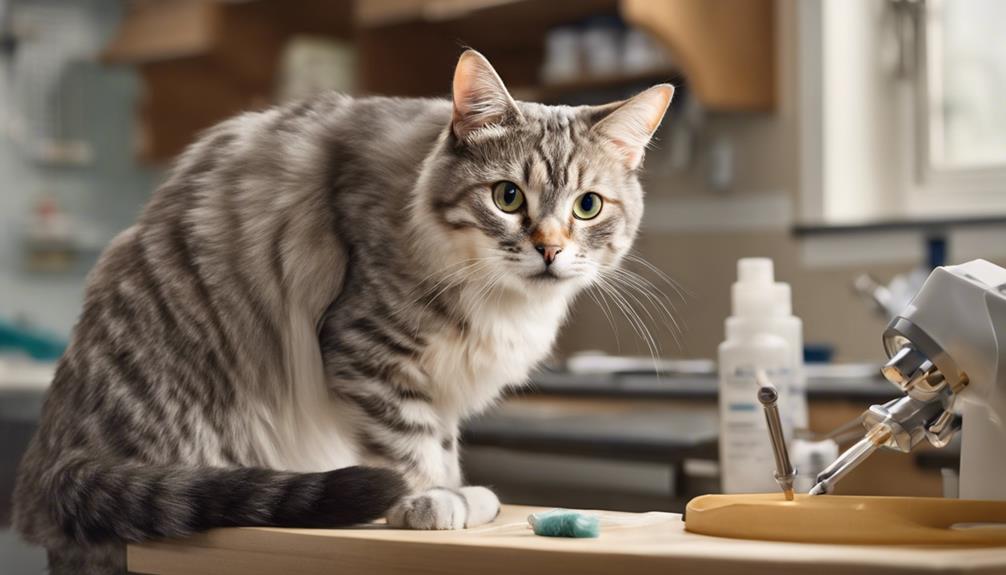
For important care and personalized treatment plans for roundworm infections in cats, seeking advice from a veterinarian is essential. Veterinarians possess the expertise to accurately diagnose roundworm infections in cats through fecal tests.
By consulting a veterinarian, cat owners guarantee that their feline companions receive appropriate and effective treatment plans tailored to eliminate roundworms effectively. Vets can recommend the most suitable deworming medications and dosages based on factors such as the cat's age, weight, and health status.
Additionally, professional guidance from a veterinarian is invaluable in monitoring the cat's progress during and after the treatment for roundworms, ensuring the best possible outcome.
In addition, veterinarians play a vital role in educating cat owners about preventive measures to avoid future roundworm infestations, empowering them to provide the best care for their beloved pets.
Hence, when it comes to treating roundworms in cats, consulting a veterinarian is the ideal choice for thorough and effective care.
Roundworm Treatment for Developing Immune Systems
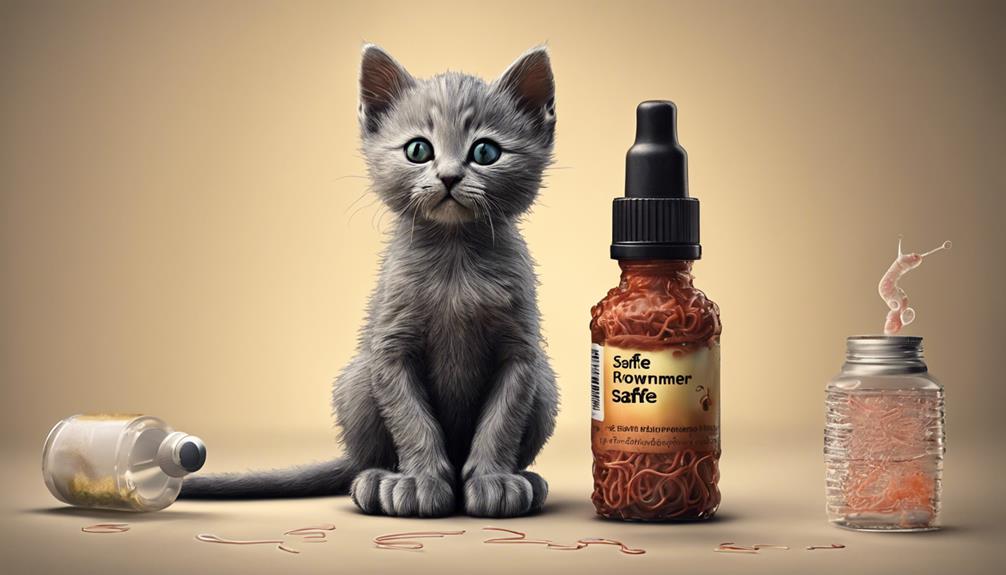
When addressing roundworm treatment for developing immune systems in kittens, timely intervention is essential to safeguard their health and well-being. Here are three essential points to take into account:
- Critical Detection: Due to their underdeveloped immune systems, kittens are more vulnerable to roundworm infections. Regular check-ups with a veterinarian can help identify any signs of roundworm infestations early on, ensuring prompt treatment.
- Consistent Deworming: Young kittens can acquire roundworms from their mother's milk, underscoring the importance of consistent deworming schedules. Following a deworming regimen recommended by a veterinarian is pivotal to preventing complications and supporting the development of their immune systems.
- Special Care: Developing immune systems in kittens require extra care when it comes to roundworm treatment. Ensuring they receive the appropriate medication in the correct dosage and following up with vet visits for monitoring and adjustments is crucial to their overall health and well-being.
Common Treatments for Roundworms in Cats
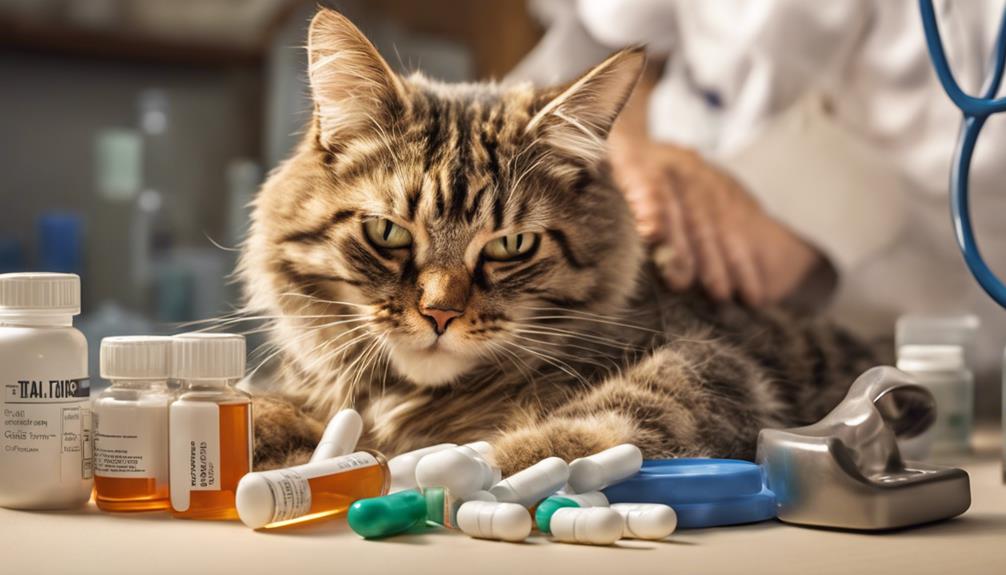
When treating roundworms in cats, there are common medications available, such as Pyrantel Pamoate and Panacur/Fenbendazole.
These treatments are effective against various parasites and have specific dosages based on the cat's weight.
Regular deworming using these options is essential to keep cats protected from roundworm infections.
Medication Options
In treating roundworms in cats, we commonly rely on effective medications such as Pyrantel Pamoate and Panacur/Fenbendazole. These medications play a vital role in eliminating these pesky parasites from our furry friends. Here are some key points to keep in mind:
- Pyrantel Pamoate: Safe for young kittens and pregnant queens, this medication is a go-to for treating roundworms. Remember to administer 0.1 ml per pound based on weight.
- Panacur/Fenbendazole: Effective against various worms and Giardia, this medication requires 3-5 consecutive days of treatment. The dosage is 0.2 ml per pound, with specific amounts based on your cat's weight.
- Regular Deworming: Consistent use of these medications every 2 weeks for kittens until 16 weeks helps prevent and manage roundworm infections, ensuring our cats stay healthy and happy.
Natural Remedies
Let's explore the effectiveness of natural remedies in treating roundworms in cats. Natural remedies like pumpkin seeds, diatomaceous earth, and apple cider vinegar can help combat roundworms in your feline friend. Here's a handy table to showcase these remedies:
| Natural Remedy | How it Works | Considerations |
|---|---|---|
| Pumpkin Seeds | Contains cucurbitacin, paralyzing and eliminating worms | Use with caution |
| Diatomaceous Earth | Dehydrates and kills roundworms in cats | Ensure food-grade quality |
| Apple Cider Vinegar | Creates an inhospitable environment for roundworms in the digestive tract | Dilute before administering |
Frequency of Worming Treatments
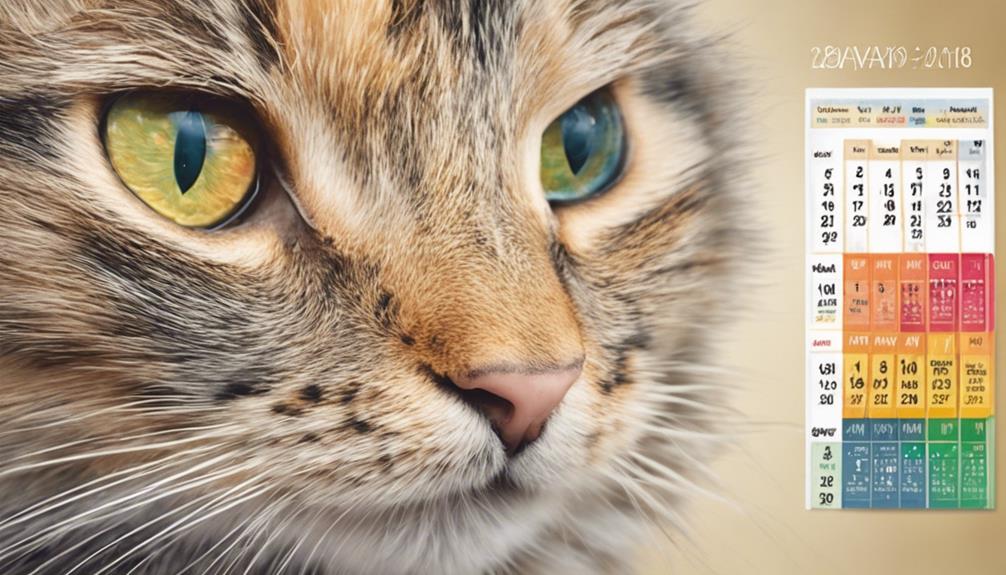
To effectively prevent roundworm infections in cats, it's important to establish a consistent deworming schedule tailored to the specific needs of your feline companion. Here are three essential points to keep in mind when determining the frequency of worming treatments:
- Kittens require more frequent deworming: Young kittens are more susceptible to roundworms and should be dewormed every 2 weeks until they reach 16 weeks of age. This helps prevent and control infestations at an early stage when they're most vulnerable.
- Regular deworming for adult cats: Once your cat reaches adulthood, it's recommended to continue with regular deworming treatments every few months. This routine helps maintain a healthy and worm-free environment for your furry friend.
- Consult your veterinarian: Every cat is unique, and their deworming needs may vary based on factors like age, health status, and lifestyle. Seeking advice from your veterinarian for personalized guidance on the ideal deworming frequency for your cat is essential in effectively managing roundworm infections.
Personalized Guidance From Veterinarians

Veterinarians offer tailored guidance on effective roundworm treatment options for cats based on individual factors like weight and health status. When it comes to treating roundworms in your feline companion, consulting with a vet is essential to guarantee the right approach. The dosage and duration of treatment can vary depending on the severity of the infestation, so personalized advice from a professional is key.
Expert Advice on Roundworm Prevention
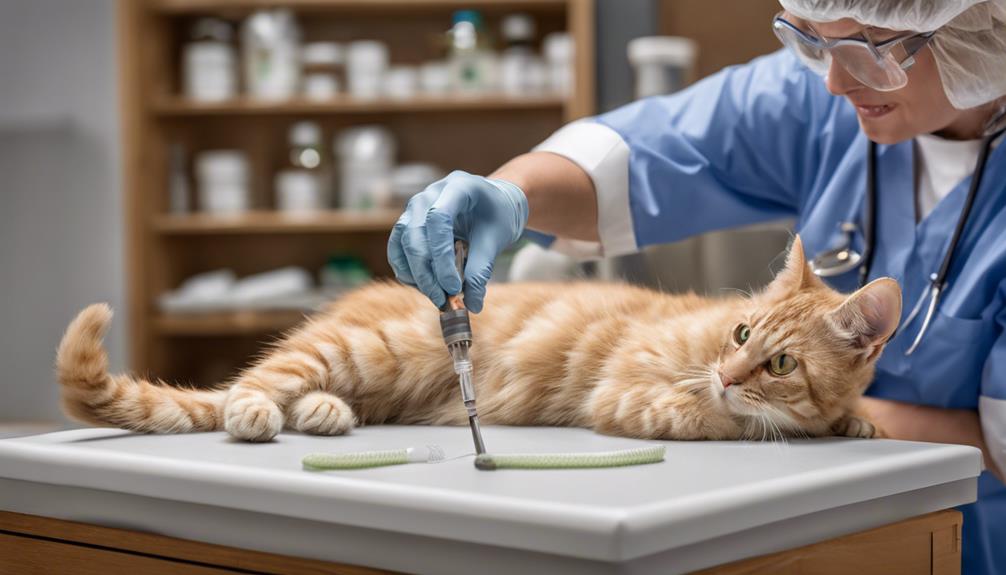
Seeking expert guidance on preventing roundworm infections is vital for maintaining your cat's health and well-being. Here are three essential tips to help you prevent roundworm infestations in your feline friend:
- Regular Deworming: Make sure to deworm your cat every few months as recommended by your veterinarian. Regular deworming is essential in preventing roundworm infections and keeping your cat healthy.
- Higher Risk for Kittens: Keep in mind that kittens are at a higher risk of roundworm infections due to their immature immune systems. It's important to start deworming them early and follow a consistent deworming schedule.
- Consult Your Veterinarian: Establishing a consistent and regular worming routine for your cat is crucial. Consult your veterinarian for the best prevention and treatment plan tailored to your cat's specific needs. Utilize resources like 'Find a Vet' or 'Online Vets' to seek expert advice on roundworm prevention for your cat. Remember, prevention is key to keeping your cat healthy and happy.
Frequently Asked Questions
What Is the Best Treatment for Roundworms in Cats?
The best treatment for roundworms in cats is Pyrantel Pamoate or Fenbendazole (Panacur). Pyrantel Pamoate is safe for kittens and pregnant queens, while Panacur treats various parasites. Regular deworming is important for preventing and treating roundworm infections.
How Long Does Roundworm Dewormer Take to Work on Cats?
Roundworm dewormer typically starts working in cats within 24-48 hours. The efficacy varies based on the product and the cat's response. Dead worms may pass in stool post-treatment. Complete elimination can take days to a week.
How Many Doses Does It Take to Get Rid of Worms in Cats?
To completely eliminate worms in cats, it usually takes multiple doses of deworming medication. The required number of doses varies based on the worm type and severity. Consult your vet for personalized guidance on treatment duration.
How Do You Clean Your House After a Cat Has Roundworms?
After a cat has roundworms, we clean our house by vacuuming carpets and furniture, disinfecting surfaces, washing bedding and toys in hot water, promptly disposing of feces, and avoiding soil contact. Our vet provides tailored cleaning recommendations.
Conclusion
To sum up, taking proactive steps to prevent and treat roundworm infections in cats is essential for their health and well-being. By collaborating closely with your veterinarian, establishing a regular worming schedule, and staying informed about the risks of outdoor activities, you can help keep your feline friend safe and healthy.
Remember, a little prevention can go a long way in ensuring your cat's happiness and longevity. Just ask Fluffy, who enjoys her outdoor adventures without the worry of pesky parasites.
